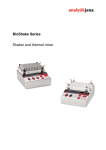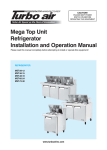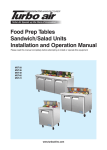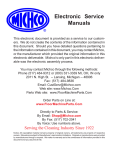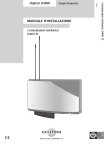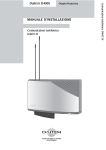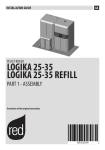Download S2 - S3 service manual
Transcript
S2 - S3 service manual Nilfisk-CFM S.p.A. Via Porrettana 1991 - 41059 Zocca (Modena) Italy - Tel. +39 059 9730000 - Fax +39 059 9730099 - www.nilfisk-cfm.com - [email protected] Table of contents Preface...........................................................................................................................................................................................page 3 Symbols.........................................................................................................................................................................................page 4 A Safety instructions...............................................................................................................................................................page 5 A.1 - Operator safety.............................................................................................................page 6 B Technical data.........................................................................................................................................................................page 9 B.1 - Technical data............................................................................................................. page 10 C Components......................................................................................................................................................................... page 11 C.1 - Trolley........................................................................................................................... page 12 C.2 - Handle complete with cable carrier...................................................................... page 12 C.3 - Filtering chamber with complete inlet and deflector....................................... page 13 C.4 - Complete container.................................................................................................. page 14 C.5 - Accessories rack......................................................................................................... page 15 C.6 - Filter ring and seal . .................................................................................................. page 16 C.7 - Filter with filter catch clamp .................................................................................. page 16 C.8 - Filter shaker cage ..................................................................................................... page 16 C.9 - Complete motor head.............................................................................page 17 C.10 - Motor head closing band......................................................................page 17 C.11 - Control panel........................................................................................page 18 C.12 - Filter shaker system...............................................................................page 18 D Vacuum cleaner operation............................................................................................................................................. page 19 D.1 - Controls and indicators. .......................................................................................... page 20 E Troubleshooting.................................................................................................................................................................. page 23 E.1 - Electrostatic discharge.............................................................................................. page 24 E.2 - Trolley............................................................................................................................ page 25 E.3 - Filtering chamber with complete inlet and deflector........................................ page 33 E.4 - Container..................................................................................................................... page 35 E.5 - Filter............................................................................................................................... page 38 E.6 - Complete motor head.............................................................................................. page 41 F Spare parts. ........................................................................................................................................................................... page 68 F.1 - Spare parts. .................................................................................................................. page 69 G Instruments.......................................................................................................................................................................... page 70 G.1 - Special instruments. ................................................................................................. page 71 H Wiring..................................................................................................................................................................................... page 72 H.1 - Wiring diagram.......................................................................................page 73 S2 - S3 service manual 2 Preface This manual provides essential information required for repairing S2 - S3 series wet and dry vacuum cleaners. When doing repairs, make sure you have a suitable workbench and the required electrical connection. If particular anomalies are noticed during maintenance, please inform the customer who should have the user manual. Appliance faults can be caused by several different factors. In this case refer to chapter E Troubleshooting. For repairs, please refer to the list of spare parts indicating the positions of each component and the relevant sequence of assembly. Read the Technical Service Bulletins carefully with the technical modifications performed after the manual was published. The Technical Service Bulletins represent a supplement of the spare parts list until the next is published. The manuals and bulletins must always be available during repairs. Other technical documents on the S2-S3 series may be required for repairs. These documents should not be transferred to third parties. ONLY USE ORIGINAL NILFISK-CFM SPARES! S2 - S3 service manual 3 Symbols Symbols used for instructions The safety instructions indicated by this symbol in the manual must be observed to avoid injury to persons. This symbol is used to indicate the safety instructions which must be observed to prevent damaging the vacuum cleaner and malfunctions. This symbol indicates suggestions and instructions to simplify jobs and guarantee safe working conditions. S2 - S3 service manual 4 Safety instructions A A.1 - Operator safety The repairs must only be carried out by personnel suitably trained for the job to do, or a qualified electrician. Before starting the vacuum cleaner, read these operating instructions carefully and keep them on hand for consultation. The vacuum cleaner should only be used/serviced by people who are familiar with the way it works and who have been explicitly authorised and trained for the purpose. Before using/servicing the vacuum cleaner, the operators must be informed, instructed and trained on how to use it and with which substances it can be used, including the safe method for removing and disposing of the vacuumed material. Use the vacuum cleaner in accordance with the laws in force in the country where it is used. Besides the operating instructions and the laws in force in the country where the vacuum cleaner is used, the technical regulations for ensuring safe and correct operation must also be observed (Legislation concerning environmental protection and safety at work, i.e. European Union Directive 89/391/EC and following). Do not perform any operation that could jeopardize the safety of people, property and the environment. Comply with the safety indications and prescriptions in this service manual. Observe the provisions of the directives and national safety regulations on the sale of electrical appliances, in particular EN60335-2-69- En.AA Vacuum cleaners for dust harmful to health are classified according to the following dust classification: 1. L (low risk) suitable for separating dust with an exposure limit value of at least 1 mg/m3, depending on the volume occupied; retains at least 99% of the vacuumed particles (See EN60335-2-69, Enclosure A.A); 2. M (medium risk) suitable for separating dust with an exposure limit value of at least 0.1 mg/m3, depending on the volume occupied; retains at least 99.9% of the vacuumed particles (See EN60335-2-69, Enclosure A.A); 3. H (high risk) for separating all dust with an exposure limit value lower than 0.1 mg/m3, depending on the occupied volume, including carcinogenic and pathogenic dusts such as asbestos. Class H14 Hepa filter in accordance with standard EN 1822; retains at least 99.995% of vacuumed particles (See EN60335-2-69, Enclosure A.A). S2 - S3 service manual 6 A.1 - Operator safety Class L-M vacuum cleaners are identified by labels with pictograms of the following meaning. . This vacuum cleaner contains dust hazardous for the health. Only authorised personnel wearing suitable personal protective equipment should empty and service the vacuum cleaner, including removing the means used to vacuum the dust. Do not use without the complete filter system in place. Class H vacuum cleaners are identified by a label with the following text. S2 - S3 service manual 7 A.1 - Operator safety Check the place of work and substances tolerated for the vacuum cleaner suitable for liquids. WARNING - DANGER ! In the case of electrical vacuum cleaners/instruments connected to the vacuum cleaner, always refer to the user manual and safety instructions. WARNING - DANGER ! Take care not to raise dust during maintenance operations. Wear a P3 protective mask. S2 - S3 service manual 8 Technical specifications B B.1 - Technical data PARAMETER UNIT OF MEASURE S2 L,M,H S3 L,M,H Voltage / frequency V/Hz 230/5060 230/5060 Power rating kW 2 3 Power rating (EN 60335-2-69) kW 1.8 2.6 Max. weight kg 67 73 Noise level (EN 60335-2-69) dB(A) 70 71 Protection IP 44 44 Insulation Class I I Capacity L 40 50 - 100 Dust bag capacity (versions M - H) L 32 32 Inlet mm Ø 70 Ø 70 Max vacuum hPa 211 211 Maximum air flow without hose and reductions L/min’ 5500 8070 Maximum air flow (3 m Ø 50 mm hose) L/min’ 4720 6500 Hoses allowed for “L” and “standard” classes mm Ø 70 Ø 70 Hoses allowed for “M” and “H” classes mm Ø 50 Ø 50 Primary filter surface (L-M) m2 1.95 1.95 Upstream absolute filter surface m2 3.5 3.5 Absolute filter efficiency according to MPPS method (EN 1822) % 99.995 (H14) 99.995 (H14) Note: •Storage conditions: T : -10 +40 °C - Humidity: ≤ 85% •Operating conditions: Maximum altitude 800 m (up to 2,000 m with reduced performances) T : -10 +40 °C - Humidity: ≤ 85% S2 - S3 service manual 10 Components C C.1 - Trolley Trolley Upright Accessory support C.2 - Handle complete with cable carrier S2 - S3 service manual 12 C.3 - Filtering chamber with complete inlet and deflector Filtering chamber Complete inlet Deflector S2 - S3 service manual 13 C.4 - Complete container 100 L container 50 L container 40 L container S2 - S3 service manual 14 C.5 - Accessories rack C.6 - Filter ring and seal Filter ring Filter ring seal S2 - S3 service manual 15 C.7 - Filter with filter catch clamp Filter Filter catch clamp C.8 - Filter shaker cage S2 - S3 service manual 16 C.9 - Complete motor head with cable and plug Motor head Cable and plug C.10 - Motor head closing band S2 - S3 service manual 17 C.11 - Control panel C.12 - Filter shaker system S2 - S3 service manual 18 Vacuum cleaner operation D D.1 - Controls and indicators 2-way selector Start/stop switch Position 0 - The vacuum cleaner is turned OFF Position 1 - The vacuum cleaner is powered and starts Main motor Start/Stop indicator and button Second motor Start/Stop indicator and button Third motor Start/Stop indicator and button If the indicator is lit, the main motor is ON. You can start/stop the main motor with this button. If the indicator is lit, the second motor is ON. You can start/stop the second motor with this button. If the indicator is lit, the third motor is ON. You can start/stop the third motor with this button. When this button is pressed all the motors Stop button stop simultaneously. The motors and internal components of the vacuum cleaner will still be electrically powered. S2 - S3 service manual 20 D.1 - Controls and indicators Low compressor pressure alarm indicator (red) Max. vacuumed material level indicator (red) If lit, this stops vacuuming and indicates an anomaly in the pressure of the compressor (if installed). Check the compressor is working. If lit, this stops vacuuming and indicates the maximum level of the vacuumed material has been reached in the container, if the level control for liquids or solids is installed. Empty the container. Power indicator Indicates whether the vacuum cleaner is powered. Primary filter indicator (green/red) Green - Indicates the primary filter is functioning properly. Red - Indicates the primary filter is blocked. This means the air speed in the suction tube is less than 20 m/s. Stop the vacuum cleaner and clean the filter. Absolute filter indicator (if installed-red) Indicates the primary filter is blocked. Stop the vacuum cleaner and change the filter. Manual filter shaker knob Lets you clean the primary filter using manual mechanical action. Shaking the primary filter Depending on the quantity of dust vacuumed, if the indicator turns red, turn the vacuum cleaner off and shake the primary filter using the knob on the side of the motor head. Stop the vacuum cleaner before shaking the filter. Do not shake the filter with the vacuum cleaner functioning, as this could damage the filter. Wait to let the dust to settle before restarting the vacuum cleaner. If the indicator is still red even after the filter has been shaken, change the filter. S2 - S3 service manual 21 D.1 - Controls and indicators Emptying the container • We recommend cleaning the filter before emptying the container. • Release the container with the lever, then remove it and empty it. Replace the container after having checked the condition of the seal. Stop the vacuum cleaner before performing this operation. Let the dust settle before removing the container. S2 - S3 service manual 22 Troubleshooting E E.1 - Electrostatic discharge Take the following precautions to discharge electrostatic charges before doing any repairs on the electrical circuits: • Touch the protective conductor to discharge any static electricity charge in your body; • If possible, wear an antistatic bracelet; • Use antistatic mats; • Never touch a circuit board or electronic components, always hold them with plastic or insulated tools; • Transport electronic components in conductive packaging (special packs to discharge electrostatic charges for example). Before proceeding with these operations, turn off the vacuum cleaner and remove the plug from the power socket. S2 - S3 service manual 24 E.2 - Trolley Unscrew the 4 screws fixing the upright side panel by hand or with a screwer. The screws in the front are a different length. The longer screws must be used near the reinforcing spacer in the side-panel. Do not swap screws S2 - S3 service manual 25 E.2 - Trolley Remove the side-panel. View of the upright. Use a hex-head wrench to loosen the top screw holding the side bracket. Loosen the bottom screw too. S2 - S3 service manual 26 E.2 - Trolley The 2 side brackets have 4 hexagonal press-fit inserts. Remove the 4 screws holding the 2 side brackets, turn the filter chamber and pull it out of the 2 trolley uprights. Take care when removing the 4 screws. Hold the filter chamber firmly Proceed by unscrewing the handle with the cable carrier. Use a hex-head wrench to tighten the 2 screws on each side of the handle. S2 - S3 service manual 27 E.2 - Trolley Use a hex-head wrench. Take care when removing the 4 screws. Always hold the handle firmly. To remove and change the cable carrier, unscrew the 6 screws holding it on the handle. Make sure the cable carrier is facing upwards. S2 - S3 service manual 28 E.2 - Trolley To remove and replace the plastic retainer of the accessories support, unscrew the screw in the centre. To remove and change the accessories support, unscrew the 2 screws holding it on the upright with a hex-head wrench. Fit the accessories supports facing the right way. This is important also in order to connect the grip properly. S2 - S3 service manual 29 E.2 - Trolley To remove and replace the container coupling bracket, unscrew the bolts with a hex-head wrench. Make sure you replace the brackets in the right position. To remove and replace the whole upright, unscrew the 2 bolts holding it on the trolley. To remove and replace the fixed wheels, unscrew the nylock nuts with a wench. Make sure the bolts are tight after changing the wheels. The wheel should turn freely. S2 - S3 service manual 30 E.2 - Trolley To remove and replace the accessories rack, unscrew the bolts under the front of the trolley. Use a suitable hex-head wrench. Remove the protective plug to remove the castors. S2 - S3 service manual 31 E.2 - Trolley Use a suitable hex-head wrench. Make sure the bolts are tight after changing the wheels. Block the trolley in place with the brakes to make changing the wheels easier. The brake should only be activated and deactivated with the feet. Never use your hands. S2 - S3 service manual 32 E.3 - Filtering chamber with complete inlet and deflector The roundhead screws must have a washer and be tightened down correctly to prevent air leaks (vacuum loss). Use roundhead screws to prevent sharp parts tearing or damaging the filter fabric. The deflector must be turned to the correct position (towards the container below). Do not fit the deflector facing upwards. Make sure the tongue that guarantees earth continuity between the motor head the filtering chamber is always fitted. S2 - S3 service manual 33 E.3 - Filtering chamber with complete inlet and deflector The seal must be fitted correctly in the side groove and bonded in place with suitable glue (such as Bostik). Also make sure the joint of the 2 parts is bonded properly. If it isn’t fixed correctly, this could lead to air leaks (vacuum loss). Do not fit the seal under too much tension in relation to its length of 1.5 m. If the seal leaks: • Loosen the four screws holding the brackets on the uprights of the frame; • Lower the filtering chamber and tighten the screws again with the half released (container lever in the middle of its travel) container pressed down on the seal; • The gasket must be replaced if it is torn, cut, etc. • Replace the seal if the degree of tightness is still not optimal. The complete inlet must be installed correctly (with the seal between the inlet and the filtering chamber and the screws tightened properly). If the screws aren’t tightened properly, this could cause air leaks (vacuum loss). S2 - S3 service manual 34 E.4 - Container To remove and replace the container wheels, remove the plastic wheel guard using a suitable wrench. The plastic support fits on the wheel bracket with 2 studs on the side. Unscrew the bolt in the wheel bracket using a hex-head wrench. To remove the release lever, use an Allen wrench to unscrew the hex-head screws in the bush welded on the container. S2 - S3 service manual 35 E.4 - Container Unscrew the screws, then remove the normal washers and serrated washer. Remove the whole lever, opening it out so it comes off the 2 welded pins. To remove and replace the roller pin, use a screwdriver and a hex-head wrench. Make sure the roller pin slides freely. S2 - S3 service manual 36 E.4 - Container When inserting in the container, check the roller pin is inserted properly and slides freely on the coupling guide mounted on the uprights. Check the container couples correctly and presses against the seal properly. Keep your hands in the right place when coupling the container. S2 - S3 service manual 37 E.5 - Filter When the vacuum cleaner is used to vacuum hazardous substances, the filters become contaminated, therefore: • Work with care and avoid spilling the vacuumed dust and/or material;_ • Place the disassembled and/or replaced filter in a sealed plastic bag; • Close the bag hermetically; • Dispose of the filter in accordance with the laws in force; • Filter replacement is a serious matter. The filter must be replaced with one that has the same characteristics (surface area and class); otherwise the vacuum cleaner may malfunction and operate in unsafe conditions; • Check the vacuum cleaner class (L-M-H). Take care not to raise dust when this operation is carried out. Wear a P3 mask and other protective clothing plus protective gloves (PPE) suitable for the hazardous nature of the dust collected. Refer to the laws in force. The filter must be changed if it is blocked, torn or cannot guarantee high filtering efficiency. If shaking the filter isn’t enough, it must be replaced. S2 - S3 service manual 38 E.5 - Filter When the complete filter kit has been removed from the motor head, unscrew the clamp and remove the filter ring. Turn the filter upside down. Cut the plastic ties and detach the cage from the filter. Fit the filter catch and the seal ring of the old filter on the new one (replace if necessary). Insert the cage and tie it to the filter using the ties (one every 2 bags) at the bottom of the filter. Don’t cut the excess off the tie after pulling tight. This prevents leaving sharp parts that could damage the filter during normal use and shaking. Before positioning the motor head on the filter, arrange the filter properly in the filter chamber. Position the filter with the bags completely extended to guarantee optimal filtering. S2 - S3 service manual 39 E.5 - Filter After having positioned the motor head, check the filter shaker rod moves correctly. The lever must be in the central position and the travel must be free in both directions without any particular difficulties. If the movement isn’t right, lift the motor head and align the filter. Try shaking again. When shaking, hold the knob correctly and take care not to trap your fingers. S2 - S3 service manual 40 E.6 - Complete motor head Open the closing band to remove the motor head from the filtering chamber. Open it out completely to remove it from the side link. Take care not to injure your hands with the snap catch. Remove the whole motor head, lifting it our of the frame, making sure you have a firm grip on it. Use the handles on the sides of the motor head. Before closing the band again, centre the motor head properly on the filtering chamber. The motor head flange must be centred and positioned perfectly on the seal of the filter ring. S2 - S3 service manual 41 E.6 - Complete motor head Remove the motor head, pulling out the hex-pin cage from the bush. When replacing the motor head, make sure the cage is inserted correctly in the bush and the filter bags are extended properly with no twists. It may be easier to assemble the cage first on the motor head and then position both on the filtering chamber. In this case, take great care not to trap your fingers. Proceed by unscrewing the filter shaker knob. Unscrew the 4 screws positioned every 90° around the motor head. S2 - S3 service manual 42 E.6 - Complete motor head Remove also the screw under the main switch. All the screws are the same length, except the one under the main switch which is much longer. Now the motor cover can be removed from the base. Take particular care with the main switch. Pull it out, removing also the control panel. S2 - S3 service manual 43 E.6 - Complete motor head Hold the bottom edge to remove the motor cover. Pull the cover out, then up. Pull the motor cover off, taking care not to damage the control panel. Turn the motor cover over and unscrew the screws inside. Remove the motor cover from the top cover. S2 - S3 service manual 44 E.6 - Complete motor head Remove the sponge in the specific housing of the motor cover. If you have to bond parts of the sponge that have come unstuck, clean the surfaces thoroughly and only then stick the sound-proofing sponge back on using a few drops of liquid glue. In any case we recommend using original spare parts, which include pre-bonded sponges. Remove the round sponge in the filter shaker lever. S2 - S3 service manual 45 E.6 - Complete motor head Remove the sponge from its seat. The 4 recessed nuts should be fitted in the 4 holes every 90°. Pull the press-fit pipes off the connectors. During assembly make sure they fit properly in the connectors and that the yellow and blue colour codes are respected. Pull the pipes off the internal clips. S2 - S3 service manual 46 E.6 - Complete motor head Pass the cables and tubes through the right holes. Disconnect the motors from the electronic board, pulling the Faston terminals off connectors M1-M2-M3. Connector M3 isn’t used in 2 motor heads. Pull the 3 Faston terminals of the motors off connectors L on the terminal board. Pull also the Faston terminal of the blue cable off connector N on the terminal board. When wiring, make sure the cables are laid out properly and hold them in place with appropriate ties. S2 - S3 service manual 47 E.6 - Complete motor head The bridge between L and N is wired in only on heads with 3 motors. To remove the board, unscrew the hex-head screw at the bottom. Unscrew the screws at the sides of the board. S2 - S3 service manual 48 E.6 - Complete motor head Unscrew them both. Remove the board, pulling it upwards. Unscrew the screws and remove the power cable of the main switch. When wiring, make sure the Faston terminals are firmly fixed on the connectors and the terminals are tight on the terminal board. S2 - S3 service manual 49 E.6 - Complete motor head Remove also the cables going to the terminal board and those connecting the switch to the components of the electronic board. Pull off the green connector and connect the blue and brown wires to the board. Pull off also the Faston terminals on the side of connectors M1-M2-M3. S2 - S3 service manual 50 E.6 - Complete motor head Always make sure the Faston terminals have been crimped correctly. Remove the ties holding the cables on the motor mounting plate to make wiring easier. Before removing the board completely from the motor head, check all the connectors have been disconnected. S2 - S3 service manual 51 E.6 - Complete motor head Don’t disconnect the wires by pulling on the wire, always hold the Faston terminal or connector. Remove the whole electronic board. Each corner of the motor stator pack has an output cable. 2 blue cables connected to the brushes of the same motor, 2 connected respectively to connector M1-M2-M3 of the board and 1 to the terminal board. S2 - S3 service manual 52 E.6 - Complete motor head Proceed by removing the motor mounting plate. Unscrew all the hex-head M6 screws on the motor mounting plate using a hex-head wrench . Hold the plate firmly on both sides and lift. The plates lifts away with the 3 motors mounted on it. S2 - S3 service manual 53 E.6 - Complete motor head To replace the motors, unscrew the 2 screws holding them on the plate. To remove the terminal board, screw in the 2 screws holding it on the plate. Pull the motor through the hole in the plate. Take care not to damage the cables. Turn or tilt the motor to pull it out. S2 - S3 service manual 54 E.6 - Complete motor head Once removed, the motor has 2 seals (top and bottom) on the fan. Remove the 2 seals from the fan. When assembling, make sure the seals are in an good condition (replace if necessary) and fitted correctly. Remove the 4 baseplates with the butterfly vacuum cutoff valves inside from their housing in the motor mount of the head. The 3 spacers of the butterfly vacuum cutoff valves must face upwards as shown in the photo. S2 - S3 service manual 55 E.6 - Complete motor head Remove the base of the motor cover, unscrewing the 3 screws at the base. The 3 screws are the same length. Proceed by unscrewing the M8 screws on the motor mount to remove the 2 spacers and the filter shaker. On heads with 2 motors (S2) remove also the baseplate closing the hole of the 3rd motor. S2 - S3 service manual 56 E.6 - Complete motor head Turn the motor head over and remove the 2 spacers. Turn the head over again and loosen the central bolt holding the filter shaker shaft. Hold the shaft while you unscrew the bolt. When fixing the shaft with the central screw, always insert the serrated washer to prevent it slipping when shaking. S2 - S3 service manual 57 E.6 - Complete motor head Remove the filter shaker shaft, tilting it and moving it upwards. Remove also the complete filter shaker. During assembly, make sure the square-seat shaft is correctly inserted and the round lever slides correctly in the slot of the filter shaker shaft. Remove the base of the motor cover from the motor mount. Turn the motor mount and pull the filer shaker shaft out of the central bush. S2 - S3 service manual 58 E.6 - Complete motor head Make sure the pipes are in the right position. Yellow on the inner D.6x1/8” fitting, blue on the external D.6x M5 fitting. The pipes are press-fit in the fittings. Use Locktite on the nuts of the air fittings. Unscrew the 3 screws holding the central bush on the motor mount. S2 - S3 service manual 59 E.6 - Complete motor head Remove the bush and seal. To dismantle the filter shaker system, unscrew the 4 screws holding it on the plate. Remove the filter shaker. S2 - S3 service manual 60 E.6 - Complete motor head To remove the 2 bumpers, unscrew the 2 bolts holding them on the frame with a hex-head wrench. Remove the bumpers and washer. To remove the filter shaker shaft, pull it out from one side of the bush. S2 - S3 service manual 61 E.6 - Complete motor head Then remove the shaft also from the other bush. The 2 bushes must be press-fit and inserted from the outside in the holes on the box. Make sure the bushes are a correct fit by sliding the filter shaker shaft. S2 - S3 service manual 62 E.6 - Complete motor head To connect the components of the control panel, see part H (Wiring). Check the connection of the power cable. The terminals must only clamp the metal tips of the Faston terminals and not the plastic insulation. Also check: All the Faston terminals have been crimped correctly. Check they can’t be pulled off the wires. All the earth wires are connected. The buttons must turn the system ON/OFF properly. The indicators must function properly (power ON, filters blocked, etc.). The pressure switch in the electronic board is supplied preset. If the electronic board malfunctions, don’t try to repair it. Replace the whole board. The power wires are already connected to the single-phase motor. Make sure Faston terminal 6.3 is connected to the board, and Faston terminal 4.8 is connected to the terminal board. If the vacuum motors are noisy or produce a lot of sparks, the brushes may need changing. S2 - S3 service manual 63 E.6 - Complete motor head To change the brushes, bend and release the tab holding the motor cap. Do the same with the tab on the other side. Open the tongues holding the brushes. Pull off the motor cap. S2 - S3 service manual 64 E.6 - Complete motor head Pull downwards and disconnect the Faston terminal with the blue wire on the brushes. Pull off carefully, taking care not to damage the tongue of the brushes. Press down on the tongue blocking the motor brush with a flat blade screwdriver. Pull out the brush. S2 - S3 service manual 65 E.6 - Complete motor head Insert a new brush, making sure it is facing the right way. Make sure the tongue holds it in place properly, so it can’t come out of its seat. Only replace the electric power cable with one of the same type as the original H07 RN-F. The same rule applies if an extension is used. All the sockets, plugs and commutators must have the same IP protection degree as the vacuum cleaner, as indicated on the data plate. S2 - S3 service manual 66 E.6 - Complete motor head WARNING - DANGER ! After having repaired the motor head, S2 - S3 service manual • before plugging the vacuum cleaner into the electrical mains, make sure the voltage rating indicated on the data plate corresponds to that of the electrical mains; • plug the vacuum cleaner into a properly earthed socket; • make sure the vacuum cleaner is turned off; • if the plug has been changed, make sure the cable is in a perfect condition (damaged cables can cause electric shocks). • The vacuum cleaner’s power socket must be protected by a differential circuit-breaker with surge current limitation that cuts off the power supply when the current discharged to earth exceeds 30 mA for 30 ms or an equivalent protection circuit. • If there are electrostatic currents on the vacuum cleaner, the earth is probably not connected or in a poor condition. In this case check the earth connections, in particular those of the inlet fittings; the hose must be antistatic. 67 Spare parts F F.1 - Spare parts Use the current spare part list. S2 - S3 service manual 69 Tools G G.1 - Special tools Digital multimeter Used to check the amperage (Amps) and voltage (Volts). Vacuum meter Used to measure the vacuum power with the inlet closed (mbar). Airflow meter Used to measure the airflow with the inlet open (m3/h). S2 - S3 service manual 71 Wiring H H.1 - Wiring diagram ABBREV. COMPONENT M1 Motor switch 1 M2 Motor switch 2 M3 Motor switch 3 MSE Filter shaker motor CL1 Level control PR1 Compressed air pressure switch HA1 Alarm - air speed in the suction tube is less than 20 m/s C1 Antidisturb filter Q1 Main switch S2 - S3 service manual 73











































































